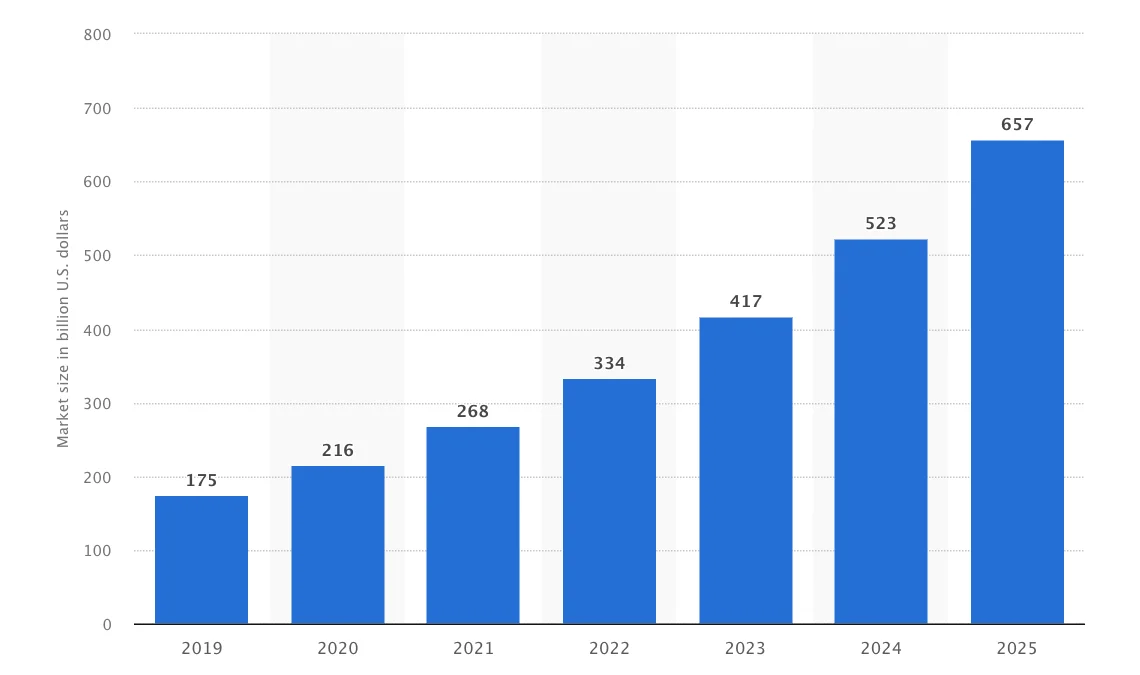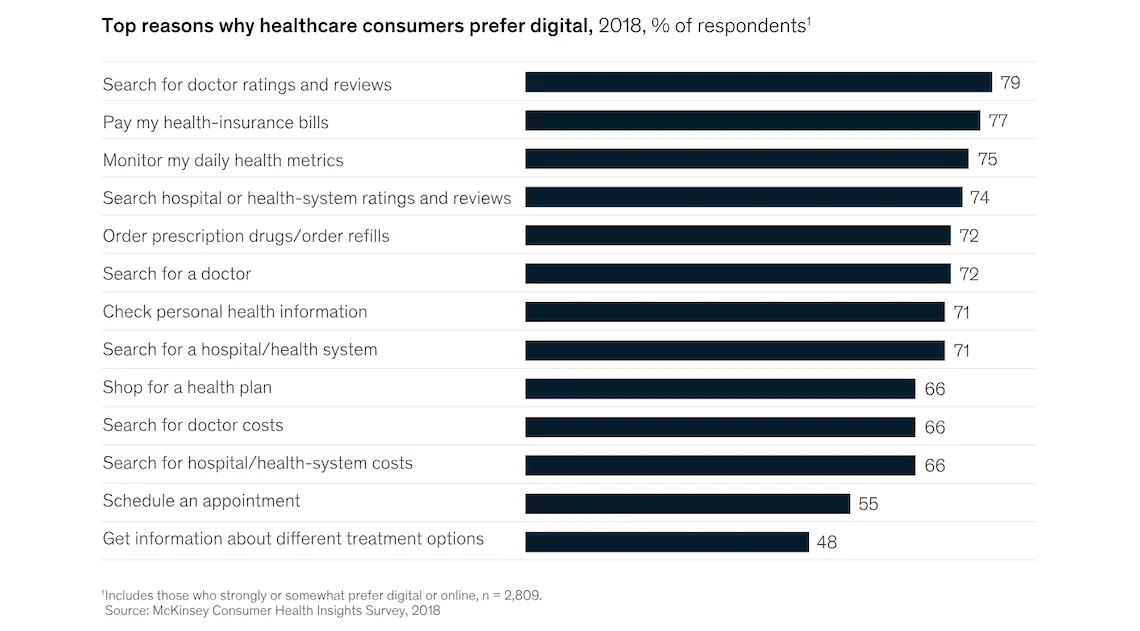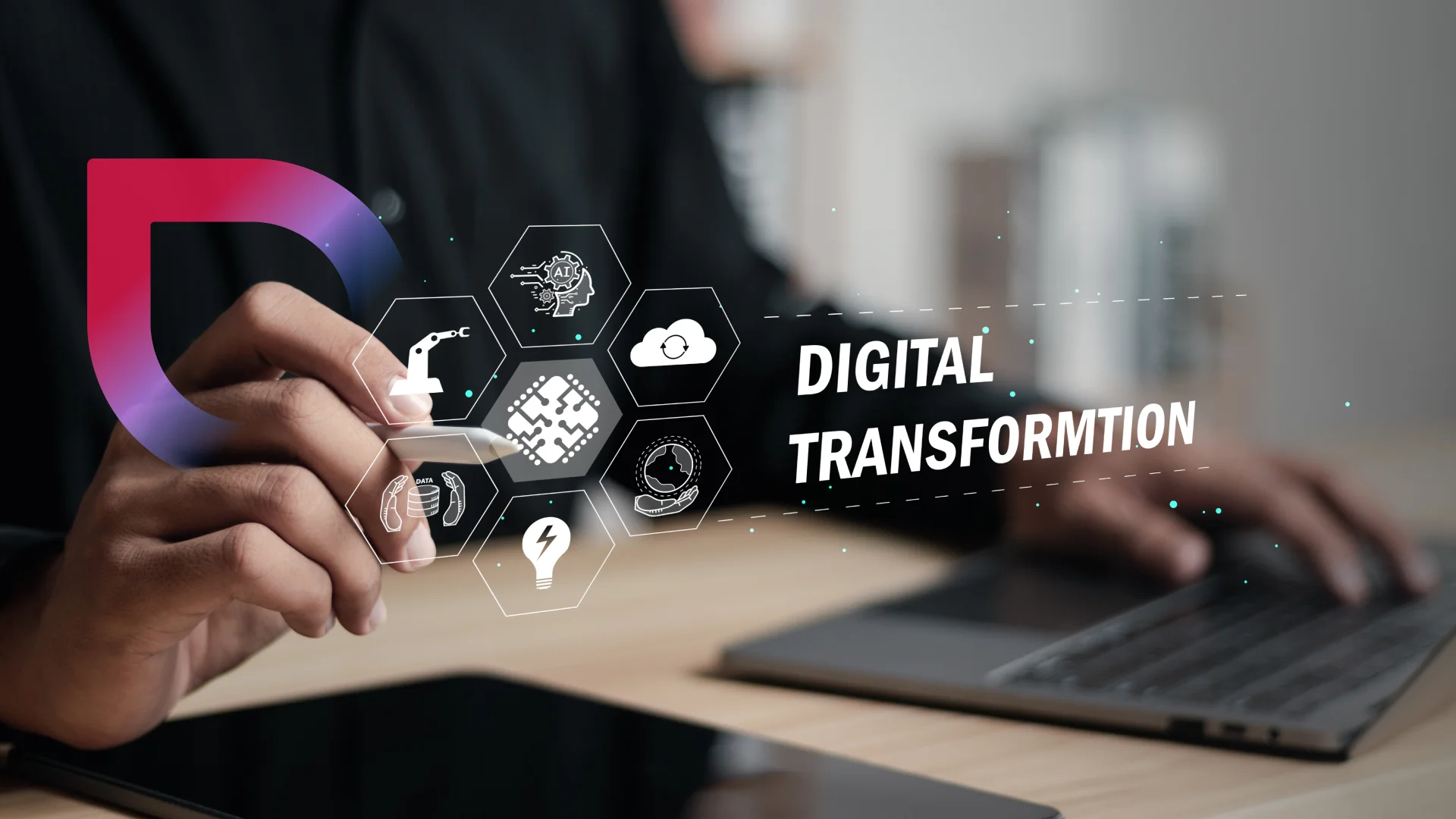Why is Digital Transformation Important in the Healthcare Industry?
- Business
- December 8, 2023
Discover how digital transformation in healthcare is reshaping the future of patient care. Learn about key drivers for healthcare and digital transformation to go hand-in-hand seamlessly. Also, explore potential challenges you can expect and how to mitigate such with a step-by-step guide to achieve digital transformation of healthcare processes.
In the technology-driven world, there’s no wonder that the healthcare industry is undergoing digital transformation, making its core services available online. From calorie tracking and other fitness metrics to consulting doctors online, we have seen many digital healthcare trends becoming a part of our everyday lives.
As per Accenture’s 2022 digital health survey, around 97% of healthcare executives consider the adoption of continuously upgrading technologies as their reliable, long-term strategy. Besides that, as per the Statista report, the global market size of the digital health market size is forecasted to cross $657 Billion by 2025.

These data show quite a benefit for the healthcare sector getting a digital transformation. Better improvement in the healthcare sector, uplifted patient experience, ease to the medical staff, and much more. With all these offerings, why not opt for it?
But to unlock all the benefits of digital healthcare transformation, taking the digital world’s experts’ advice is a must-have. So, let’s take a deep dive into the world of digital transformation in healthcare, exploring the benefits and challenges that come with exciting shifts.
What is Digital Transformation in the Healthcare Industry?
Digital transformation in healthcare is the adoption of the latest digital technologies, solutions, and strategies to improve various aspects of the healthcare industry. The aim of the healthcare digital transformation is to improve patient experience, streamline operations, bring efficiency to primary healthcare, and overall improve healthcare operations.
By opting for digital transformation in healthcare organizations, they can offer their patients the convenience of booking appointments and online consultations with doctors and ordering medicines in the comfort of their homes. They can even keep patients’ data synced with their cloud-based systems and utilize EHR data to derive better healthcare insights on disease detection and provide better treatments for the same to avoid the worst chronic conditions and make this world a healthy place to live.
Oh, okay! So that’s what digital transformation in healthcare means, but you also want to know the scenarios necessary for this digital paradigm shift.
Why do Your Healthcare Organizations Need Digital Transformation?
The change is inevitable! We all know about this, but unlike other industries, the healthcare sector has to deal with its unique challenges. And those make it necessary for this vital industry to reshape its operations by opting for digital transformation. Here are the key drivers of healthcare and digital transformation:
Technological Advancements
Gone are the days when traditional methods were the only way to access healthcare advice and primary care. However, technological advancements, including cloud computing, big data analytics, mobile support, and the Internet of Things (IoT), have made every industry take a step further to digital transformation to provide convenience to their users, and the healthcare industry is no exception.
As the youth is becoming more tech-savvy, industries also have to make a shift to meet the expectations of their consumers. It also raises chances for the industry to create a new channel to earn better revenue and make their services available to the wider user base.
Changing Patient Expectations
With technology providing conveniences to the users to access most of the primary services, like shopping, movie ticket booking, and more, online, patients also have demands to book an appointment and consult their preferred doctor at their convenience and order medicines online.
Not just that, some patients do want to take treatments from their homes and expect doctors to check their vitals every through remote patient monitoring systems.
Moreover, around 79% of patients prefer digital services to search for doctor ratings and reviews, 72% to order prescribed drugs/order refills and search for doctors, 71% to search for hospital/health-system costs, 55% to schedule an appointment with doctors, and 48% to get information about different treatment options, and much more.

Due to all these reasons, healthcare facilities need to have digital systems in their place to meet patients’ growing expectations for digital healthcare.
Regulatory Influences
You may know about HIPAA compliance, which aims to provide standard practices to secure patient health data. But there is another regulatory standard known as HITECH (Health Information Technology for Economic and Clinical Health Act) introduced by former president Mr. Barack Obama in 2009 to promote the adoption of Electronic Health Records (EHR Systems) to take a step further in the digital transformation of the healthcare sectors in the US region.
Within this Act, they also provided incentives to motivate healthcare organizations to transfer their paper-based health-related data to digital platforms for better conveniences. So, the healthcare organizations stated in the US region have this government regulatory influence for digital transformation.
Of course, in other countries, there will be such regulations and compliances to make the healthcare processes more convenient for the patients and the staff.
Global Healthcare & Pandemic-induced Challenges
With the progress in healthcare research and new drug discoveries, various virus variants continue to emerge, wreaking havoc on people’s health worldwide.
It wasn’t too long ago—in 2019—when we all confronted a deadly pandemic known as COVID-19 (Coronavirus) and witnessed its devastating effects. During that time, people around the world were compelled to work from home. In addition to that, many lost their jobs, and countless lives and loved ones were lost. It felt as if 2019 to 2021 went by in a blur.
Consequently, this pandemic set a trend and served as a catalyst for every industry to embrace digital transformation, like cloud computing in healthcare apps, healthcare mobile app development, and AI/ML and IoT-enabled solutions to adhere to social distancing regulations.
Due to its contagious nature and the need for minimal physical contact, many medical practitioners adopted telemedicine apps to provide online consultations to their patients.
As a result, such pandemics have become significant drivers for the healthcare industry to explore new methods and practices, striving for improved healthcare outcomes while keeping pace with the changing times.
Need for Cost-efficiency and Resource optimization
As time passes, the service cost is bound to rise alongside. This cost increase applies to the healthcare industry as well.
As per CMS data, in 2021, U.S. healthcare spending grew to 2.7%, with $12,914 to $4.3 trillion per person. And it did not even count all this spending into the better revenue part.
In some countries, medical expenditure even goes to waste. In the case of the US, around 30% of medical expenses go to waste. It leads to the need of proper medical cost management, along with resource optimization.
By adopting digital healthcare solutions, hospital facilities can automate their basic management from reception tasks to appointment scheduling, optimizing medicine supply chain processes, and streamlining tasks (like scheduling consultations, operations, staff assignment, etc.). With all this ease, hospitals can easily allocate and manage their staff and focus more on healthcare cost-efficiency.
Read also: How to Find the Best Digital Transformation Partner?
What are the Benefits of Digital Transformation in the Healthcare Industry?
Along with the access to the basic medical services online, digital transformation offers several benefits to the healthcare sector, which are:
Improved Patient Care
By adopting healthcare solutions, like telemedicine apps, remote patient monitoring systems, EHR systems, and many others, built by harnessing the power of innovative technologies, you can aim to provide better patient care.
With telemedicine apps, you can allow patients to schedule an appointment and even consult doctors online who meet their requirements for medical specialization, availability, better care, and consultation fee criteria.
As the name suggests, remote health monitoring enables healthcare staff to track patients’ health and vitals in real-time. Using EHR systems, medical staff can add, edit, access, and even delete patients’ health data.
Healthcare organizations can also utilize the power of electronic health records to get insights to make quick, informed decisions and provide more accurate and personalized treatment to patients.
Better Medical Staff Efficiency
The adoption of digital healthcare solutions for the entire hospital helps to streamline many hospital administrative tasks, like billing, appointment scheduling, and tracking staff assigned with particular procedures. The EHR systems enable authorized personnel to easily access and manage patient data.
Using hospital-specific digital systems, they can even keep track of medical supplies and automate their refill whenever they go below the marked limit.
With all these, a healthcare facility can run effortlessly and utilize the saved time to focus more on patient care.
Data-driven Decision Making
By building an EHR system with the support of data science support, you can perform data analysis on your patient records and get useful insights to make data-driven healthcare decisions. This intelligent medical record analysis approach helps you detect patient diseases early on before they convert into chronic conditions. This way, you can utilize your EHR system as your preventive healthcare measure.
Not just on EHR, you can also utilize data science methodologies and predictive analytics for the hospital staff system to allocate hospital staff more effectively.
Better Healthcare Staff and Patient Communication
Communication is the key; we all know that! In the healthcare industry specifically, communication is crucial to provide better diagnoses to patients.
Getting digital transformation in the healthcare sector helps hospital staff to keep updated regarding patients’ doses and their health to manage further medication and treatment accordingly.
Through telemedicine portals, patients can openly communicate with their doctors regarding their health conditions and allow doctors to provide better treatment by prescribing pathology tests and primary medication.
Top-notch Security and Privacy
It’s true that digital transformation also brings concerns for data privacy and security. But by complying with the HIPAA standards and following the digital healthcare system security best practices mentioned in it, you can ensure top-notch security and privacy.
Apart from that, the involvement of blockchain technology in implementing the digital healthcare system can elevate its security.
Cost Reduction
Making digital innovation in healthcare adds its positive impact on the healthcare facility’s cost reduction. Utilizing healthcare software systems, facilities can automate their administrative tasks, like appointment scheduling, bill creation, patient data update, and much more, resulting in time saving, which can further be utilized for extra patient care.
Seeing the time impact, healthcare facilities can also minimize their administrative staff and use the saved budget to hire more medical professionals and healthcare systems/devices to level up their treatment standards.
Also Read: Top Healthcare Technology Trends to Follow in the Upcoming Years
What are the Challenges of Digital Transformation in Healthcare?
A gateway to better conveniences often comes with many obstacles and ongoing challenges. And the path to digital transformation of the healthcare industry also invites many challenges to overcome. The most common challenges of digital transformation in healthcare are as follows:
Data Security and Privacy Concerns
Digital transformation indeed offers many conveniences to patients and healthcare professionals with its powerful software solutions. But what about the digital security and privacy concerns it draws?
With access to centralized data systems and internet connectivity, it also draws the attention of cyber attackers seeking to get into your systems to extract sensitive patient information for their malicious intent. A healthcare software system without cybersecurity measures in place may become a victim to such malicious actors and have to pay a hefty price for cybersecurity and data compromise.
Integration and Interoperability
Many healthcare organizations use different software products for different use cases, which are not communicating with each other or have no connectivity with each other. In such cases, due to their different coding standards and other technical differences, it may create certain integration challenges for them to interoperate and communicate seamlessly.
Healthcare App Implementation and Management Cost
Healthcare/medical software product development requires high-level features with utmost accuracy and robust security standards. Due to their high-end product engineering in healthcare apps and further technological advancement-based upgradation and maintenance requirements, it may cause excessive production and maintenance costs.
Pacing Up with Continuously Upgrading Technologies
In this technology-driven world, nothing is more constant than change! Pacing up with the change and meeting its requirements is the solution that helps your digital healthcare journey to stay efficient and competitive.
However, meeting this continuous change requirement is itself challenging due to the technical complexity of digital healthcare apps. Moreover, healthcare professionals may resist the transition to digital tools due to usability and change in workflows.
Resources and Infrastructure Limitations
Healthcare staff often lack the IT skills to completely utilize the potential of digital technologies. Also, ensuring resilient internet connectivity and adequate IT infrastructure in their premises may be a challenging task.
Therefore, they require the assistance of IT professionals to train healthcare staff and ensure the robustness of the healthcare infrastructure.
Regulatory Compliances
The healthcare sector is heavily regulated, and keeping it up-to-date with technological advancements can be a huge challenge while complying with HIPAA (Health Insurance Portability and Accountability Act) standards, Federal Trade Commission Act, HL7 Standards, the HITECH Act, and more.
Ethical Considerations
Digital innovation in healthcare will indeed create a path to efficiency, interoperability, and a fully managed culture. But what about the ethical concerns it leads to during decision-making based on the data it provides?
This leads to the concern for the system’s accuracy. It also raises questions about the bias, decision-making, and every role digital technology plays in patient care.
Steps to Embrace Digital Transformation in Healthcare Smoothly
The ride to digital transformation is not a smooth ride due to the challenges we just have mentioned above. However, there’s a way to avoid such, which is by following certain steps or what we call best practices to achieve digital transformation of the healthcare sector:
1. Defining a Clear Digital Transformation Strategy
At the time of creating a digital transformation strategy, it is a must to involve stakeholders and identify specific goals and objectives, whether it is to improve patient engagement, streamline operations, cost reduction, harden cybersecurity, assess their current capacity, consider technological requirements, and more.
2. Keeping Data Security and Compliance at the Core
Regardless of the digital transformation goal, you must consider its data security standards and healthcare compliances to build a robust system for better reliability.
3. Providing Training to the Healthcare Staff
It’s obvious that the healthcare staff do not have IT skills. Hence, for them to use digital systems effortlessly and deal with some basic technical challenges specific training is needed.
4. Engaging Patients in the digital Healthcare Transformation Journey
When the system you’re designing is for the patients’ use, it’s a must to involve them from the product research time to know their challenges, expectations, experience, and more to build a system solving their difficulties.
5. Continuously Measuring the Impact of Digital Transformation
This is a post-adoption measure, but an important one. It ensures what are the positive changes that the digital transformation has brought to the healthcare sector and what to consider to improve results and provide better patient care.

How can MindInventory Help you Adopt Digital Transformation for Your Healthcare Organization?
The healthcare sector is certainly moving in the right direction with adequate support from digital transformation, Big Data, and the Internet of Things. All this has reduced human effort to a great extent, and the most exciting part is that it has curtailed the medical expenditure bill of the patients, empowering them appropriately.
With digital transformation, the patient does not have to wait in the long queue for getting the treatment as it has introduced Telemedicine, much to their delight. They can even get access to their reports using the cloud and mobility. All in all, it is excelling the healthcare sector to higher scales along with the Internet of Things.
If you’re planning to start the digital journey of your healthcare organization, then MindInventory can be your healthcare IT service partner. After serving in IT for over a decade, MindInventory has been a trusted technology partner for healthcare digital transformation projects, like Waitless – a telemedicine app, EnneaApp – a psychological personality finding app, Helponymous – an app connecting people dealing with health issues or other ones, and many more to add.
With expertise in many cutting-edge technologies, like AI/ML, Blockchain, and other web and mobile app development technologies, we can help you, from the research stage to product publishing, with further maintenance and support. So, interested in partnering up? Contact us today!
FAQs on Digital Transformation in Healthcare
The cost to adopt a digital transformation for your healthcare organization may depend on many factors, including time type of digital solution, the scope of the digital transformation, the technology selected, skills & location of the technical talents, etc. Still curious to know about the cost of your digital transformation journey? Contact us with your requirements today!
As the healthcare organization operates with a limited staff and provides limited services, it’s understandable for them to have a limited budget. Still, thinking about making their digital transformation, they can start by preparing their digital transformation goal, the outcome they want to receive, prioritizing existing SaaS tools, seeking partnerships and collaborations, or looking for cost-effective services to create their custom healthcare IT solution.
The future of the digital transformation in the healthcare sector is all about getting better predictive analytics, more personalized treatments and access to healthcare resources, AI taking over many healthcare parts, blockchain technology getting more exposure for better security and transparency, telemedicine taking a step further to the advancements, and many more to see.
The success of the digital transformation in healthcare can be tracked through improved patient outcomes, increment in efficiency, time-saving ratio, cost saving, patient satisfaction rate, and other KPIs.
Some popular examples of digital transformation in healthcare include Telemedicine and Telehealth, Electronic Health Records (EHRs), Wearable Health Devices, Patient Portals, Remote Patient Monitoring, and more.













